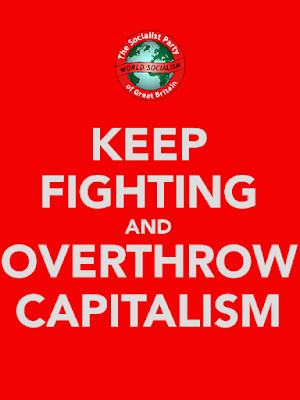We agree with the need for a genuine socialist party, but insist that this should be on a sound basis, namely a clear definition of what socialism is and a clear refusal to advocate reforms of capitalism. We are not saying that workers shouldn’t try to get the best they can out of capitalism, but that’s the job of trade unions and other similar organisations, not of a socialist political party. In our view, the job of a socialist party is to advocate “a complete and utter change of society” to socialism and nothing but this. History shows that a party that advocates reforms inevitably becomes the prisoner of its reform-minded supporters and eventually ends up giving only lip-service to the socialist transformation of society. Why do you think that instead of the Labour Party gradually changing capitalism, as some of its members once used to want, the opposite has happened and capitalism has gradually changed the Labour Party—into what it is today and which many feel is no longer worthy of support? Why make the same mistake again?
We are very emphatic on this point. The clear duty of a genuine socialist party is to work for real socialism. It has no justification for existence apart from that. The only work a socialist can do is to teach socialism. We can never advocate anything that conflicts with socialism for that is to obscure socialism and to impede oneself as a socialist.
Suppose someone actively campaigns for a particular reform, what then?
In the first place the socialist aim has receded, however temporarily, into a secondary position. Socialism is not being taught — the working class crying for bread is given— a stone.
Secondly, such work that needs no socialist party at all.
Thirdly, the particular reform worked for will not appreciably affect the condition of the working class as such.
Fourthly, it will therefore have wasted the working-class strength concentrated upon realising it.
Fifthly, it will, because it has effected no material improvement in working class conditions, have bred disappointment, and, from disappointment, apathy.
And finally, sixthly, it will have made existing confusion worse confounded in the minds of the working class.
Therefore, we contend that teaching socialism and explaining the phenomena of industrial development in the light of socialism is the proper work of a socialist movement. Many think we are too narrow, too doctrinaire, without regard to the feelings of members of other political parties. We are only interested in the maintenance of truth. Truth can only be maintained inside the logical method. If we over-leap logic we over-leap ourselves and land in a bog of confusion and disappointment. Therefore, the truth, even if it means that we become for the time as voices crying in the wilderness.
The cause of working-class misery is private ownership of the means of life. The interests of the workers, who do not own the means of life, are opposed to the interests of the capitalists, who do own them. This clash of interests is the class struggle. These things continue because the working class are unaware.
Although their interests continually clash with those of their masters, they do not understand that this is inevitable. Nor do they understand that their masters' ownership of the means of life is at the bottom of the trouble.
Now why, with this continual conflict of interest, do the working class remain ignorant? And why are they so desperately apathetic? Is their ignorance not because the truth has not been told? And is their apathy not born largely of disappointment with the results of past efforts of their class to secure some amelioration of their condition?
We need not enquire for the moment into the honesty of working-class teachers and leaders. We need only deal with the teaching and leading.
The school instruction of the working class is not such as would enable the child to get a glimmering of the truth of the position. It would be surprising if the capitalist class, dominant in the legislature (because dominance there is essential to the maintenance of their economic ascendancy) should take steps to instruct the children of the working class concerning working-class poverty. So we will consider the teaching and leading the workers receive alter they have entered the industrial and political arenas.
Now do the majority of working-class teachers explain that the working-class position is inevitable under present conditions? That there is no name given under heaven whereby the working class may be saved except socialism? That until socialism there can be no cessation of the clash of interests between capital and labour? That the class struggle persists unflaggingly?
Leave out of account those who do not claim to be socialists. If socialism is the only remedy, and they are not socialists, their teaching cannot be correct because they do not teach socialism.
What of those who profess socialism? Our answer is that although they talk of it occasionally, they do not teach it.
The important thing in a teacher of socialism is that it should always be socialism that he or she teaches. If one does not explain every manifestation of class conflict in the light of socialist philosophy, one will be little, if any, better than the non-socialist mis-leader. The teaching is neither logical nor consistent. One is either a fraud or a fool.
These be hard words but they are not bitter. Working class ignorance and apathy which must be dispelled before socialism can be realised, so far from being effectively combated by working-class leaders and teachers are contributed to by most of them. For example, if we were to tell the unemployed that unemployment must last as long as capitalism and were then to recommend them to send a deputation to the representatives of the capitalists to ask that the capitalists should abolish unemployment, we should either be a knave or a fool. We should have cut ourselves off from logic and landed the audience in a bog of confusion and disappointment. We argue that capitalist representatives are in control of the political machinery to conserve their own interests as against those of the working class and that we must regard capitalist representatives always as a hostile force against whom war must be waged unceasingly until they are utterly vanquished. And if we suspend hostilities and enter into alliance with them, we land in the bog of confusion and disappointment.
If we assume that poverty and misery must last till socialism, that until socialism nothing can materially or permanently affect the position; if we say that palliatives are therefore of little use, so little use indeed that we must have a party that shall concentrate upon the thing that matters (socialism) rather than the things that do not matter (palliatives); and assure that our organisation, founded because palliatives were not good enough, shall not concentrate working-class effort upon the realisation of snake-oil cure and engulf fellow-workers in the pit of impotence and despair.








